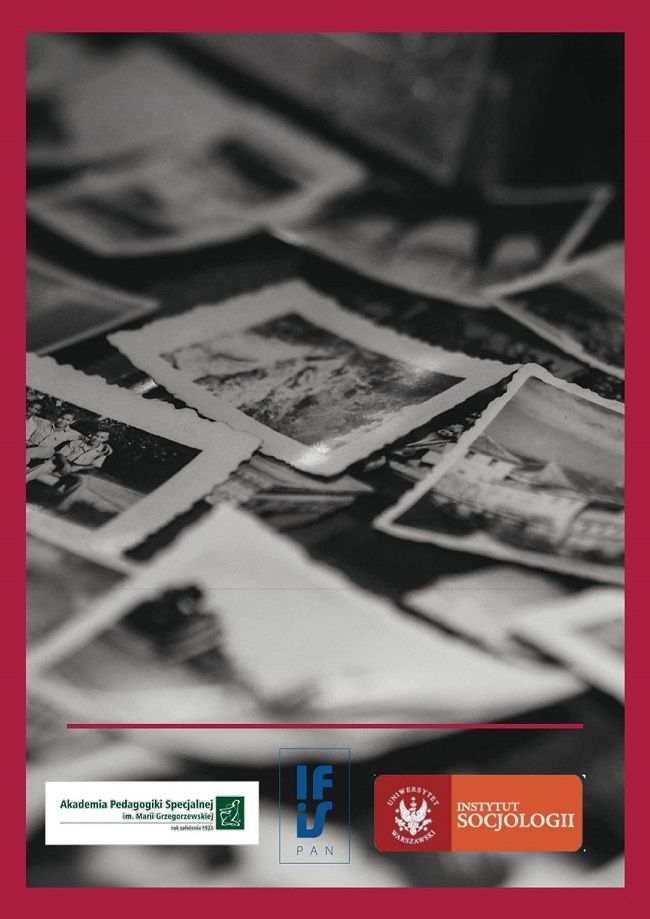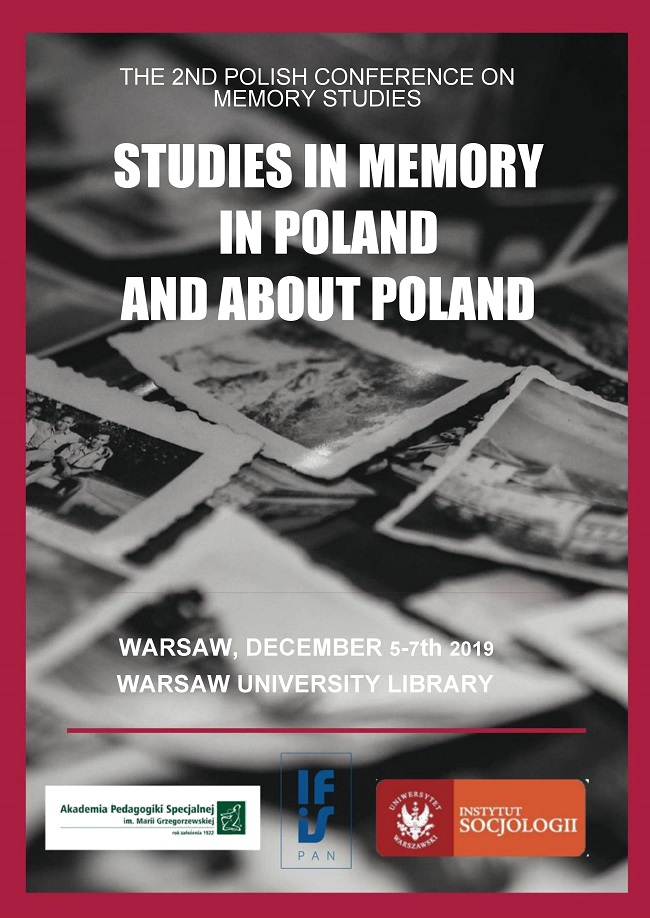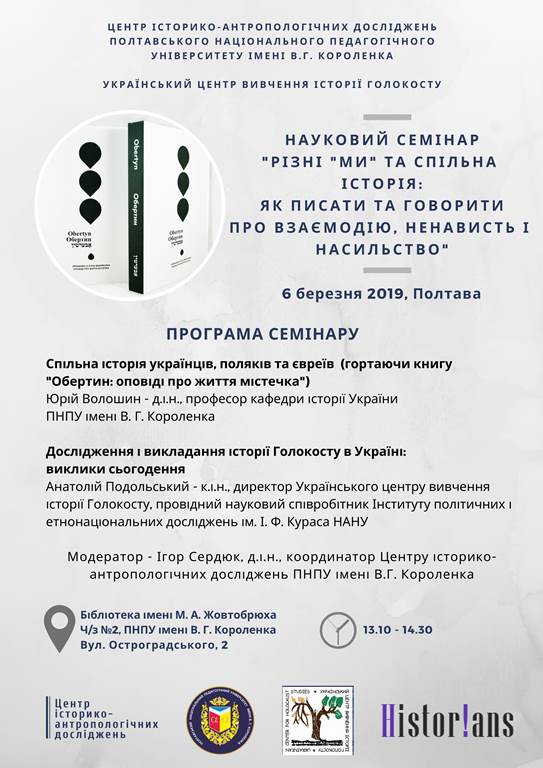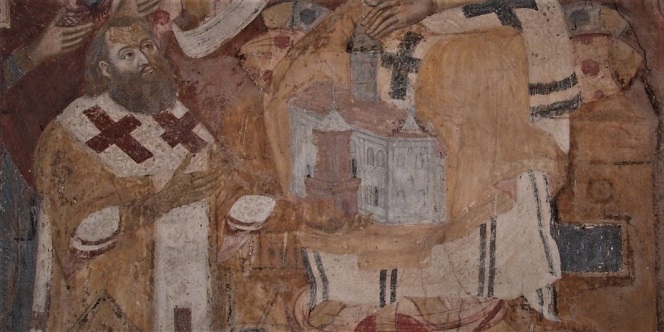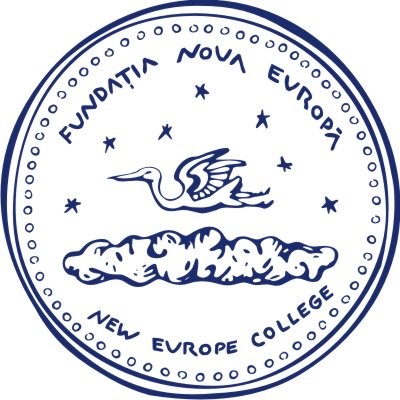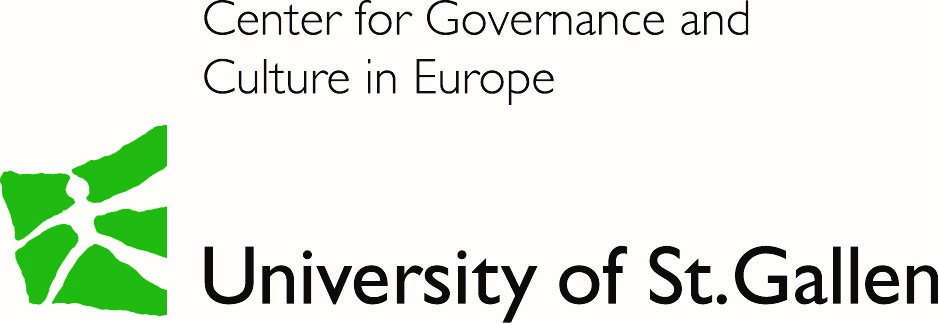Оголошення
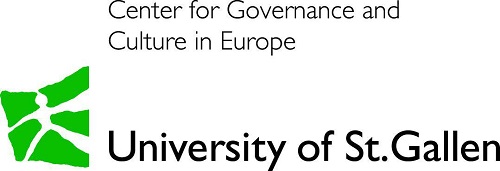
Borderlands and Contact Zones in Ukraine and the Black Sea Region
Annual Conference of the “Ukrainian Regionalism: A Research Platform” Network 11-14 September 2019
Vinnytsia, Ukraine
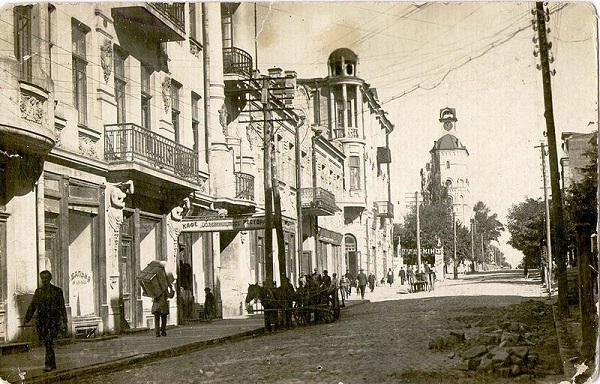
The Holodomor Research and Education Consortium of the Canadian Institute of Ukrainian Studies, University of Alberta, announces the availability of a fellowship for an individual working in the field of Holodomor studies to attend the Genocide and Human Rights University Program (GHRUP) (August 5 – August 16, 2019).
This annual graduate-level course, organized by the International Institute for Genocide and Human Rights Studies in partnership with the History Department at the University of Toronto, is taught by a team of leading specialists and incorporates genocide theory, history, sociology, political science, anthropology, psychology, and international law. The GHRUP seeks to provide participants with the intellectual framework to understand the numerous complex issues related to genocide through an examination of major case studies that provide the foundation for comparative analysis.
HREC will cover the cost of tuition, travel up to $1,200.00 CAD, and accommodations, and will provide a modest living stipend.
The application deadline is April 30, 2019. To apply, please follow the instructions at https://www.genocidestudies.org/ghrup and write to hrec@ualberta.ca with copies of the application materials.
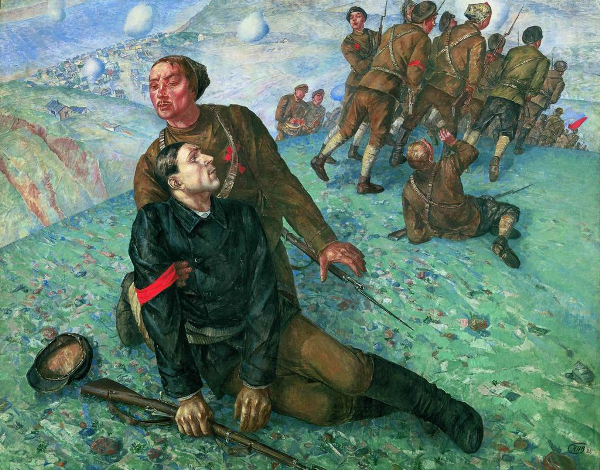
There was no bread. There was no iron. There
was hunger, death, lies, horror and terror—it was
the year nineteen.
Boris Pilnyak, The Naked Year [1920]
A hundred years ago, the former Russian empire entered the “Naked Year,” a paroxysm of the civil war that erupted after the 1917 revolutions. For a long time, this war was considered to be a fight for power between the “Reds” and the “Whites.”
This description is now challenged by interpretations using a far more diverse colour chart: historians currently use shades of red and white, not forgetting the “green” of the rebel peasants and the colours of different national movements that emerged during that period. Today, these times of trouble are not only understood as a fight for power, but also as an infinite fragmentation of the space between concurring powers and authorities. The decay and the subsequent disappearance of the Imperial state made way for the emergence of multiple institutions (states, but not only) that were created on the basis of limited territories, political, social or ethnic groups.
It is this very diversity that this conference aims to study. It seeks to deconstruct, for a better understanding and comprehension, the big concepts used by historians. Shall we speak about the civil war or about civil wars (as does J. Smele)? What is this “war?” Is it a sum of several conflicts? What are the groups usually referred to as “Reds,” “Whites,” “Anarchists,” “Nationalists” etc.? How can we define these actors? What are their practices?
Thanks to new archival sources which have been made available, we seek to work at different levels of analysis. The first approach is a vertical one: we need to think about the role of leaders and rulers but also simple soldiers and activists. These categories can and must also be geographical: local studies, at a micro level, will be welcomed. The vastness of the post-imperial space presumes multiple situations, each of whom merits to be studied and compared in order to avoid the unified narrative that the participants tried to put forward, especially after the events. We also need to readdress the concepts of centre and periphery, thinking about the structuring of this space.
At a micro-level, the individual had to react to the conflict depending on his/her social determinants (class, gender, nationality…). The sociology of contemporary civil wars might help us to analyse personal trajectories, to understand how people got involved in the conflict or refused to take part in it, tried to adapt themselves and to survive. It may also help to understand how people suffered from social, ethnic, gender assignments or how the Civil War represented a turning point in the life of certain people and could even create opportunities for social promotion.
The question of violence — sparked by revolution and counter-revolution — was at the centre of scholarly attention after the “end of communism” and focused on institutional coercion. It is now understood in a more plural form (including rapes, pogroms…) and placed in a broader post-World War I context. This approach allows us to compare the situation in the former Tsarist Empire with other countries in order to investigate interactions and interferences between countries and to point out similarities and specificities.
Different chronological frames could also be useful to understand the Civil war in depth. Analysis might be centered on the events or include a larger period. The conflict can be traced in its enduring representations in images, sounds, and objects, and in individual behaviours and in social relationships. It was a “formative experience” (Sheila Fitzpatrick) not only for the Soviet regime and its actors but also for the society and contributed for a long time to give shape to their interaction and practices. These years of deprivation, arbitrariness and violence caused traumas that individuals, families, social groups and institutions have had to overcome by producing various narratives, but sometimes just by forgetting or trying to forget the tragic events.
This conference aims to take part in this historiographical renewal by presenting case studies at different levels based on original sources on the following issues:
1. TERRITORIES / POPULATIONS / INSTITUTIONS
The Civil war was a political moment. There were multitude attempts at creating institutions or States such as in Ukraine or in Russia. Contributions could examine the practices of State-Building, as well as the creations of new political or military systems… The involvement of individuals in these processes can also be studied.
We would also like to study the national or supranational character of these institutions as the Bolshevik Revolution claimed both internationalism and the right to national selfdetermination.
2. MATERIALITY OF THE WAR / SOLDIERS / VIOLENCE / HATRED
Contributions could examine how the civil war was waged in the most material meaning of the word. Extreme violence of the war should be studied more precisely through its practices and manifestations.
What were the objects of the civil war? The weapons?
What was a fighter’s life like?
How did people face the challenges of trying to live hunger and disease?
We welcome contributions on the fronts of the civil war: how were they organized? What form did they take?
How were the spaces of the civil war dominated? How were cities and villages taken during the civil war? Was the countryside under control and by whom? How did information, orders and plans circulate?
Health care in the civil war may also be a topic of interest. Contributions could address the role of different health organizations, as the different Red crosses, the combat against diseases or the way wounded were treated, for example. The role of civilians should also be examined. Were they an obstacle for military operations, a mass of people to be subjected and (re) moved, or were they actors in the conflict?
3. CIVIL WAR AND INTERNATIONALISATION OF THE CONFLICT
Can the history of foreign intervention be rewritten? Do new sources authorise a reinterpretation of the internationalist commitments? A history of practices? Local interactions?
4. REPRESENTATIONS AND TRACES OF THE CIVIL WAR
The question of memory of the civil war (and its history) will be part of our work. How was the history of this war constructed and how is it presented in museums and monuments? Both in its immediate aftermath and several decades later.
PRACTICAL INFORMATION
Organising committee: Eric Aunoble (U of Geneva), Jean-François Fayet (U of Fribourg), François-Xavier Nérard (U of Paris 1 Panthéon Sorbonne)
With the support of LabEx EHNE
SUBMISSION OF THE PROPOSALS
The paper proposals, of approximately 300 words, written in French or in English, accompanied by a brief CV (1 page maximum), must be sent before the 1st of May to the following address conferencecivilwar@gmail.com
The organizers of the conference will take care of accommodation and meals of the participants for the duration of the event. Please let it be known if you need a partial or a total funding of your transport cost. The budget, which is limited for the event, cannot permit a generalised coverage of the expenses.
10th Annual International Student Conference of the Cold War History Research Center, Budapest
CALL FOR PAPERS
from BA, MA and doctoral students
The Cold War History Research Center is now accepting proposals for its 10th Annual International Student Conference to be held at Corvinus University of Budapest on June 4–5, 2019.
The conference will be organized in collaboration with the European Institute at Columbia University, New York.
Keynote speaker:
Vladislav M. Zubok, Professor, London School of Economics, the author of A Failed Empire. The Soviet Union in the Cold War from Stalin to Gorbachev.
As was the case with our previous conferences, this year’s Conference will focus also on the Cold War era in general, and on the post-Cold War period.
Possible topics may include (but are not limited) the following sections:
Hungary in the Cold War
East Central Europe in the Cold War and its Aftermath
Western Europe and the Cold War
The Soviet Union and the United States in the Cold War
Asia and Africa in the Cold War and its Aftermath
International Relations during the Cold War
International Relations in the post-Cold War era
Please, send us an abstract on any of the above mentioned topics. Abstracts should be approximately 3000–5000 characters long and should be sent in Word format via email to Research Coordinator, PhD candidate Valeria PUGA ALVAREZ: coordinator@coldwar.hu
The deadline for proposal submission is: April 30, 2019.
Selected participants will be asked to make a 20-minute presentation at the conference; a written paper is no requirement.
About us: The Cold War History Research Center is a virtual center for Cold War history research in East Central Europe established in 1998. Through the Center’s English language website (www.coldwar.hu), established in 2000 our mission has been to be the main provider of freely available English language online materials concerning research on contemporary history of the former Soviet Bloc countries in Europe. We offer a great number of articles, documents, chronologies, bibliographies and finding aids and now the Center is an indispensable resource for international scholars and students interested in the history of the Cold War, Communism, Eastern Europe and the Soviet Bloc.
In 2017 we have finalized publishing of our extensive and unique Chronology of the Soviet Bloc (1945–1991) which is accessible on our website. We have also published the online version of an edited volume collecting the best papers of our student conferences from 2010 to 2016: Students on the Cold War: New findings and interpretations. (A similar volume will be published in 2019 based on the papers of the conferences in 2017–2019.) CWHRC’s other recent publications include: Bibliography of New Cold War History, Documentary Evidence on the Hungarian Mediation Efforts between the US and the Democratic Republic of Vietnam (1965-1967), French Diplomatic Documents on the 1956 Hungarian Revolution.
The series of the annual two-day English language international student conferences on the history of the Cold War started just ten years ago, in 2010, with the participation of BA, MA and PhD students from all over the world and from renowned universities such as Columbia, American University, US Military Academy at Westpoint, Indiana University, Hong Kong, Humboldt, University of Bologna, University of Florence, Central European University, University College London, St. Andrews University and the King’s College of London. Since 2016 the conferences have been co-organized by the European Institute at Columbia University in New York with the participation of 6–8 Columbia students annually.
The Center launched an international internship project in 2009. So far the internationally renowned research activity of the Center has attracted 222 interns from Western and Eastern Europe – mostly in the framework of the Erasmus program –, the United States (26), China, Ukraine, Turkey, Greece; altogether from 36 countries. In 2017 the Center also became an official internship partner of Oxford University.
For the program of our previous conferences and for more information about the Center and its internship program, please, visit our website (www.coldwar.hu), or contact Valeria PUGA ALVAREZ at the email address above.
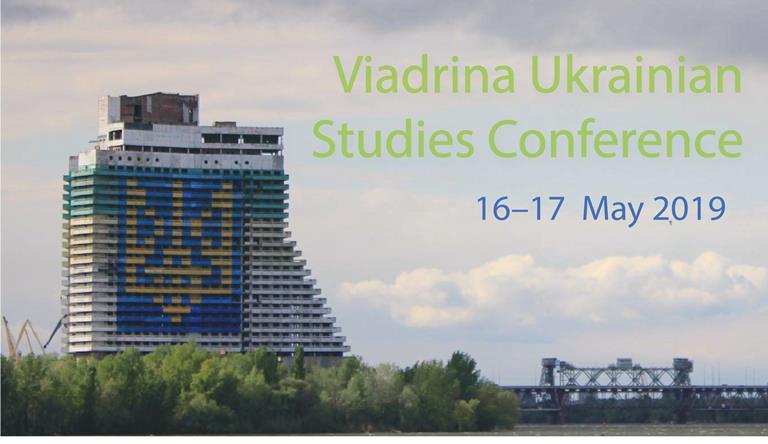
Viadrina Ukrainian Studies Conference
Rethinking Ukrainian Studies:
Locally, Regionally, Transnationally
16 - 17 of May 2019
with
Jan C. Behrends (Potsdam), Timm Beichelt (Frankfurt/Oder), Werner Benecke (Frankfurt/Oder), Liliya Berezhnaya (Münster), Rory Finnin (Cambridge), Susi K. Frank (Berlin), Olena Haleta (Lviv), Alexander Kratochvil (Berlin), Oleksandr Osipian (Leipzig), Andrii Portnov (Frankfurt/Oder), Viktoriia Sereda (Lviv), Barbara Türnquist-Plewa (Lund), Annette Werberger (Frankfurt/Oder), Andrew Wilson (London), Serhy Yekelchyk (Victoria, Canada), Tatiana Zhurzhenko (Vienna) and others
Call For Applications
10 Travel & Accommodation Grants
For Young Researchers
Who can apply?
Young researches (MA and PhD students, postdocs) dealing with Ukrainian topics are welcomed to apply for a travel and accommodation grant to attend our conference and participate in all of its activities.
How to apply?
Please send your application in one pdf file:
- CV
- a short essay “How Ukrainian Studies Could be Reconsidered Nowadays”
to the email address ukraine@europa-uni.de untilApril 8, 2019.
Successful applicants will be awarded a travel grant (up to 200 Euro) and an
accommodation at the dormitory for two nights (16–18 May 2019).
They are also expected to prepare short reports/blogs/essays about the conference
to be published online.
Confirmation letters will be sent until April 15, 2019.
Organiser Prof. Dr. Andrii Portnov,
Chair of Entangled History of Ukraine,
Director of the PRISMA UKRAЇNA Research Network Eastern Europe

3–4 жовтня 2019 р. Центр міської історії Центрально-Східної Європи, Львів, Україна
Задум семінару полягає у тому, щоб поглянути на в’язниці як публічні простори, які попри закритість, за своєю суттю є частиною міської канви. Ми прагнемо обговорити місця відбування покарання як мікрокосм міських суспільств та проаналізувати їх переосмислення та сучасне використання. Історично, місця ув’язнення були частиною системи карного законодавства, тож тюрми часто розташовувалися неподалік від будівель суду. Незважаючи на те, що у XIX столітті вони були міськими спорудами на периферії, з розбудовою міст у ХХ столітті більшість в’язниць опинилися у центрі міста.
Семінар запрошує дослідників розглянути динаміку між практиками виключення і специфічним переплетінням соціальних відносин, які формувалися між ув’язненими та адміністрацією тюрем. Наша мета – вийти за рамки фукодіанської моделі контролю та наративу дисциплінування монополізованого державою та інтерналізованого в’язнями. Семінар радше розглядатиме тюрми як простір домовляння між різними суб’єктами, серед яких не тільки ті, хто діяв від імені держави (наприклад, наглядачі, капелани чи медики), а й юридичні суб’єкти і самі ув’язнені, які мають хай і обмежену, але свою активну роль у використанні тюрми для власних цілей. Хоча тюрми сприймаються як символічні і метафоричні місця репрезентації держави, нас насамперед цікавлять конкретні міські середовища місць ув’язнення та взаємодія і стосунки між задіяними акторами.
Запрошуємо подавати пропозиції зі всіх галузей гуманітарних і суспільних наук, і сподіваємося залучити до розмови науковців, які вивчають різні періоди і місця, та досліджують зв’язок між практиками ув’язнення і міськими середовищами. Чекаємо на зголошення на такі і інші теми і питання:
Тюрми як мікрокосми: що ми знаємо про внутрішнє соціальне життя ув’язнених?
Тюрма як інкубатор сучасностей: як впливали тюремні мережі на довколишні суспільства?
Після тюрми: як міста давали собі раду з темним минулим просторів насильства у самому своєму центрі?
Структура конференції:
Перший день семінару розпочнеться з сесії «Бригідки: будівля та її історії» про минуле Львівського слідчого ізолятора, відомого як тюрма Бригідки у польській, українській і єврейській історії. Розташований цей об’єкт у самому центрі міста, і там досі знаходиться діючий слідчий ізолятор СІЗО № 19. Ми спробуємо поглянути на історію цього місця з емпіричної точки зору та об’єднати різні історіографії, які досліджували Бригідки як простір для дій держави, насильства, але також і повсякденного спілкування і домовляння між представниками держави, ув’язненими, і мешканцями міста. На другий день семінар розгляне ширші контексти тюремних просторів у міському середовищі. Під час останньої частини семінару ми розглянемо різні досвіди перетворення тюрем у публічні місця. І завершальна дискусія поставить питання, наскільки вони актуальні сьогодні для Львова, і загалом для цього регіону.
Учасники
Запрошуємо зголошуватися до участі як досвідчених вчених, так і молодих дослідників та аспірантів. Семінар відкритий для дослідників з різних дисциплін, таких як історія, антропологія, соціологія, урбаністичні студії, історія архітектури, студії комунікації, культурологія та пов’язані галузі. Семінар планується як міжнародний академічний формат з розісланими заздалегідь тезами. Ми плануємо прийняти до 15 учасників.
Як зголоситися
Щоб взяти участь в семінарі, надсилайте свої тези (до 500 слів); коротку біографію (1-2 стор.) до 15 травня 2019 р. на адресу conferences@lvivcenter.org з темою листа «Тюрма і місто». Ваша заявка має пояснити зв’язок вашої теми з темами і питаннями семінару та вказати короткий список джерел.
Оргкомітет оголосить про результати відібраних доповідей на семінар до 1 червня 2019 р.
Реферат попередньої публікації (до 5000 слів) очікуються до 10 вересня 2019 р.
Мови
Робоча мова семінару – англійська.
Під час семінару про Бригідки і публічної дискусії буде забезпечено синхронний переклад в парі українська-англійська мови.
Фінансування
Організатори компенсують витрати на дорогу та проживання у Львові.
Дати
15.05.2019 р. – для зголошень
1.06.2019 р. – надання інформації про відібрані пропозиції
10.09.2019 р. – для надсилання рефератів
Організатори
Німецький історичний інститут, Варшава
Центр міської історії Центрально-Східної Європи, Львів
Партнери
Львівська міська рада
Львівське регіональне представництво Консультативної місії ЄС (EUAM) Україна
Оргкомітет:
Фелікс Акерман
(Німецький історичний інститут, Варшава)
ackermann@dhi.waw.pl
Софія Дяк
(Центр міської історії Центрально-Східної Європи, Львів)
s.dyak@lvivcenter.org
Олег Разиграєв
(Східноєвропейський університет імені Лесі Українки, Луцьк)
razygraev@ukr.net
Ілюстрація: Оберхард



